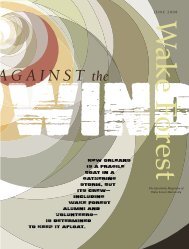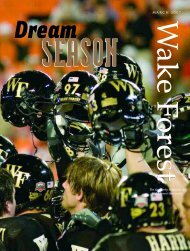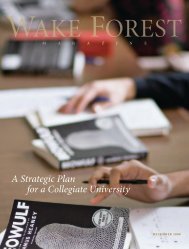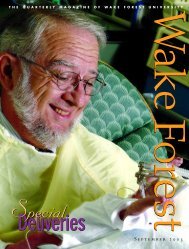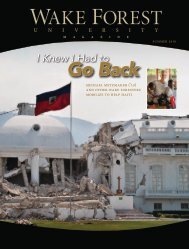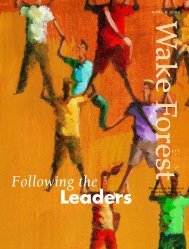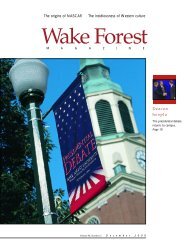Covers Contents - Past Issues - Wake Forest University
Covers Contents - Past Issues - Wake Forest University
Covers Contents - Past Issues - Wake Forest University
- No tags were found...
Create successful ePaper yourself
Turn your PDF publications into a flip-book with our unique Google optimized e-Paper software.
worldwide had been the springboard that ledhim to IJM,” Funk said. “He wanted to knowhow we as Christians are delivering justice.”By the following March, Funk was providingHaugen with an answer first-hand after travelingwith an IJM group to India to assist victims ofbonded slave labor. When residents there are ina financial crisis, money is often borrowed fromlocal lenders, who then put them to work to payoff the debt.“They go to work for the lender and are notallowed to leave until the money is paid back in alump sum,” Funk said. “But the interest rate is oftenso high that the money can rarely be paid back.”Funk saw with his own eyes the kind of laborit often takes, including a seven-month pregnantwoman making bricks in the hot sun, a man inflip-flops breaking rock with a sledgehammer,and children hand-rolling cigarettes.“Often children will inherit their parentsloans, or the kids need money to pay for theirmother’s funeral,” Funk said.He spent 10 days in India, interacting withmore than 250 people in IJM’s one-case-at-a-time,two-fold approach: bringing justice for individuals,and sending a message to others in the communitythat perpetrators will be held accountable. He andother lawyers interviewed bonded workers andprepared affidavits that legally explained their loansand working arrangements. As a result, more than100 of the bonded laborers were relieved of theirobligations. “It’s somewhat like a medical missiontrip,” Funk said. “You can bring immediate reliefand have an impact on the lives of others.”Funk returned to Nashville a changed man,but with a wife, Betsy Brakefield-Funk (’92),and two daughters to care for, he knew thoseresponsibilities came before another IJM trip.Still, he kept in touch with the organization andproudly provided pictures of his cross-the-globejustice mission to anyone interested. That includedhis nephew, David Wells (’05).“I was very familiar with Sam’s trip and sawmany of those pictures over the years,” said Wells,who majored in business and whose mother is thesister of Funk’s wife. “When Sam had the opportunityto go on another mission, he called andasked if I wanted to go. I jumped at the chance.”It was June 2005. Wells, a recent graduate,had two months before beginning a new job inCharlotte, while Funk had just welcomed a thirddaughter to his family. The invitation was totravel to Nairobi with two other attorneys towork on behalf of victims of police brutality andsexual assault. The men would pay their ownexpenses, estimated at $4,000, and miss two weeksof work. But the hardship paled in comparisonto what lay ahead.“What immediately struck me the most whenwe arrived were the extremes of society thatexist,” said Wells, who served as a technologyliaison on the mission, researching cases, assistingwith investigations and interviewing witnesses.“Working day to day as a caseworker, I was inone of the largest slums in the world and seeingpeople who live on less than a dollar a day.”The group soon heard of a man arrested on aminor incident and put in jail to await his charges.By law the charges were to come within 48 hours.But on the third day his wife came to visit andfound her husband dead on the floor of his cell.“He was lying in a pool of blood, and the steeldoor was off its hinges,” Funk said. Local policereported the death to be suicide, but IJM, with thehelp of Funk and his fellow lawyers, filed suitagainst the attorney general of Kenya and Nairobi’spolice chief. In a city plagued by slow systemsand crowded courts, the case is still pending.With Kenya on the “No Travel” list for UnitedStates citizens, Funk and Wells experienced thedanger of their surroundings every day. They visiteda 3,000-capacity prison that held 6,000 inmates,90 percent of whom were waiting to be tried.And they stayed in a hotel surrounded by a brickwall. Armed guards held mirrors under every carapproaching the hotel to look for explosives andwere there to welcome opening elevator doors onevery floor. “Being in a situation where we wereobviously American, we had to keep aware ofwhat was going on,” said Wells. “In Nairobi, theword is that a third of the city spends the day protectinga third of the city from a third of the city.”Shortly after Funk returned to Nashville, hegot a call he had been hoping to receive. The fightfor justice had allowed a jailed man to receive hisunconditional release. “It’s nice to know that yourwork can make a difference, and that IJM can besuch a good resource,” said Funk. “Each yearis different (for me), but I’d certainly like to goagain sometime.”Scott Holter is a freelance writer based in Seattle.www.wfu.edu/alumni SEPTEMBER 2006 51




